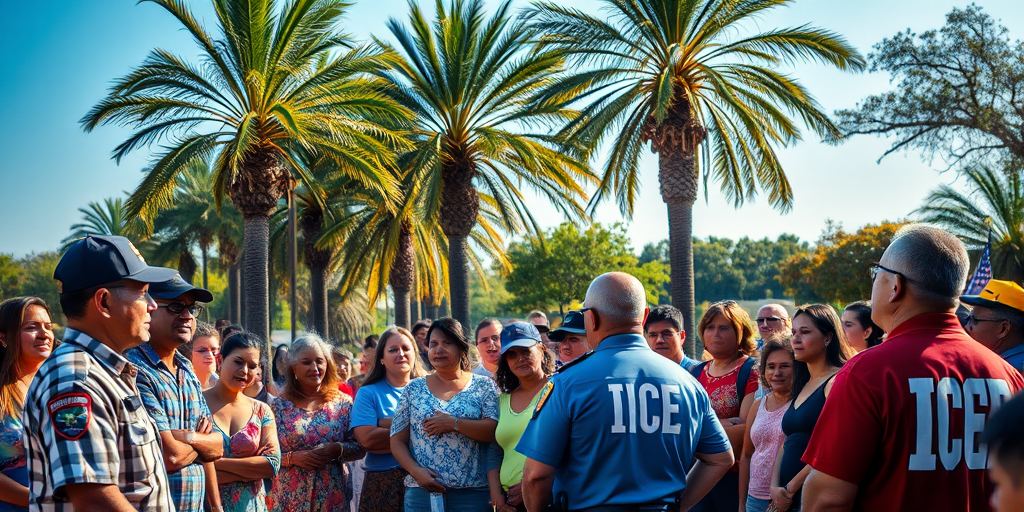San Benito Restaurant Reopens Following ICE Raid
In a blend of resilience and community challenges, Taqueria El Mante in San Benito has reopened just days after an Immigration and Customs Enforcement (ICE) raid led to the arrest of eight of its workers. This incident, emblematic of the ongoing immigration enforcement issues that ripple through small businesses across the Rio Grande Valley (RGV), underscores the complex realities faced by Valley residents and business owners dependent on undocumented labor in South Texas.
Raid Triggers Temporary Closure and Community Reaction
The ICE operation, part of a broader enforcement initiative targeting several businesses in Cameron County, cast a particularly severe impact on Taqueria El Mante. The raid prompted an immediate two-day closure, leaving owner Anita Quiñones and her remaining staff grappling with the aftermath. Quiñones expressed deep concern regarding the sustainability of her business amid reduced staffing levels and altered operating hours.
Alyssa Estrada, a waitress who witnessed the raid, described the scene as “an ugly feeling,” recounting how her colleagues were performing routine work duties when federal agents arrived. “They’re getting people that are working; they’re not in the streets, they’re not hurting anyone,” Estrada commented, capturing the sentiment many hold about the complexities of immigration enforcement affecting good neighbors.
Impact on Local Economy and Business Operations
The raid’s reverberations are felt throughout San Benito and beyond. With fewer employees available, Taqueria El Mante is now cutting back its hours, operating only until mid-afternoon. Owner Quiñones laments this reduction, indicating the necessity to close earlier despite usually staying open from 7 a.m. to 10 p.m. daily.
Quiñones voiced her challenges in sourcing local labor, stating that, despite 13 years in business, finding staff with legal work authorization willing to undertake certain roles remains difficult. She contends, “In those 13 years, we’ve never had an American apply to wash dishes. But Mexicans, that’s why we come. To work.”
Community and Broader Regional Challenges
The San Benito community, nestled in an area significantly impacted by immigration issues, finds itself at the intersection of federal enforcement and local economic concerns. The ICE raid amplifies tensions already present in a region where businesses frequently rely on undocumented workers for roles that are hard to fill.
Beyond employment, the incident speaks to broader systemic issues, raising the profile of how critical the labor of undocumented workers is to the Valley economy. Particularly in fields like agriculture and service, business owners find themselves advocating for employees who are vital to their operations, yet vulnerable to policy enactments.
Political and Social Dynamics
While local officials have not commented directly on the raid, the events have reignited conversations around immigration policy and its local implications. Supporters of more stringent regulations cite national security concerns, whereas critics, including community leaders and advocates like Dr. Rosa Martinez from the Border Institute for Human Rights, highlight the human costs and disruptions such actions cause. “We need to consider the everyday contributions of these workers, who are community members actively participating and enriching our society despite their undocumented status,” Dr. Martinez stated.
Such enforcement activities also coincide with rising scrutiny over federal immigration methods, with multiple cases highlighting confrontational encounters. In San Benito, a related incident during the same raid escalated when a Mexican national was accused of assaulting one of the agents, further emphasizing the tense atmospheres often surrounding such operations.
Future Considerations and Community Resources
Looking forward, San Benito and the wider RGV community face significant discussions about how to balance enforcement with compassion and economic necessity. Stories like that of Taqueria El Mante may inspire local and state legislative efforts to explore more inclusive policies that align with both economic and moral imperatives.
As Taqueria El Mante regains its footing, resource hubs are being set up by advocacy groups to offer support and legal guidance for those affected by immigration raids in the Valley. Valley residents seeking assistance or wishing to engage more broadly on the issue can access resources through local nonprofit organizations such as the Texas Civil Rights Project and La Union del Pueblo Entero.
Continuing Local Dialogue
The reopening of Taqueria El Mante stands as a testament to community perseverance in the Rio Grande Valley, highlighting an ongoing dialogue about the diversity and complexity of immigration. Within this context lies an opportunity for broader understanding and legislative reflection concerning South Texas’ most pressing issues.
As the region contends with these realities, it becomes vital that the voices of the affected remain centered in discussions of policy and community reform, ensuring the Valley continues to thrive amidst its formidable challenges.







